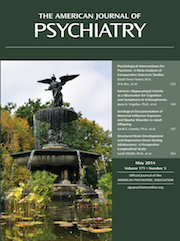Intrinsic Hippocampal Activity as a Biomarker for Cognition and Symptoms in Schizophrenia
Abstract
Objective
Identification of biomarkers for cognitive dysfunction in schizophrenia is a priority for psychiatry research. Functional imaging studies suggest that intrinsic “resting state” hippocampal hyperactivity is a characteristic feature of schizophrenia. The relationships between this phenotype and symptoms of the illness, however, are largely unexplored. The authors examined resting hippocampal activity in schizophrenia patients and healthy comparison subjects and analyzed the relationship between intrinsic hippocampal activity and cognitive function in patients as measured by the MATRICS Consensus Cognitive Battery (MCCB).
Method
Twenty-eight schizophrenia patients and 28 age-matched healthy comparison subjects underwent functional “resting state” 3-T MR scanning. Hippocampal activity was extracted by group independent component analysis. Correlation analyses were used to examine the relationship between hippocampal activity and MCCB composite and domain scores in patients, as well as between hippocampal activity and positive and negative symptoms.
Results
Greater activity of the right hippocampus at rest was observed in patients relative to comparison subjects. In patients, a significant negative correlation was observed between right hippocampal activity and composite MCCB T-score. The correlation was driven by the MCCB domains of attention/vigilance, working memory, and visual learning. Hippocampal activity was positively correlated with negative symptoms. MCCB scores were inversely correlated with negative symptoms.
Conclusions
These findings suggest that greater intrinsic hippocampal activity is a characteristic feature of schizophrenia that is broadly associated with cognitive dysfunction, and they support hippocampal activity as a candidate biomarker for therapeutic development.



